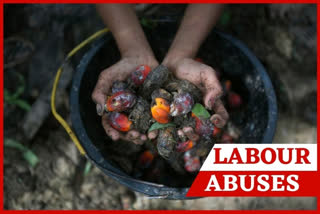Peninsular Malaysia: An invisible workforce of millions of labourers from some of the poorest corners of Asia toil in the palm oil industry, many of them enduring various forms of exploitation, with the most serious abuses including child labour, outright slavery and allegations of rape, an Associated Press investigation has found.
In Malaysia and Indonesia, these workers tend the heavy reddish-orange palm oil fruit that makes its way into the supply chains of many iconic food and cosmetics companies like Unilever, L’Oreal, Nestle and Procter & Gamble.
Together, the two countries produce about 85 per cent of the world’s estimated USD 65 billion palm oil supply.
Palm oil is virtually impossible to avoid. Often disguised on labels as an ingredient listed by more than 200 names, it can be found in roughly half the products on supermarket shelves and in most cosmetic brands. It’s contained in paints, plywood, pesticides and pills. It’s also present in animal feed, biofuels and even hand sanitizer.
The AP interviewed nearly 130 current and former workers from two dozen palm oil companies who came from eight countries and laboured on plantations across wide swaths of Malaysia and Indonesia. Almost all had complaints against their treatment, with some saying they were cheated, threatened, held against their will or forced to work off unsurmountable debts. Others said they were regularly harassed by authorities, swept up in raids and detained in crowded government facilities.
They included members of Myanmar’s long-persecuted Rohingya Muslim minority, who fled ethnic cleansing in their homeland only to be sold into the palm oil industry. Fishermen who escaped years of slavery on boats also described coming ashore in search of help, only to be trafficked onto plantations sometimes with police involvement. They said they worked for little or no pay and were trapped for years.
The AP used the most recently published data from producers, traders and buyers of the world’s most-consumed vegetable oil, as well as US Customs records, to link the labourers’ palm oil and its derivatives from the mills that process it to the supply chains of top Western companies like the makers of Oreo cookies, Lysol cleaners and some of Hershey’s chocolatey treats.
AP reporters witnessed some abuses firsthand and reviewed police reports, complaints made to labour unions, videos and photos smuggled out of plantations and local media stories to corroborate accounts wherever possible. In some cases, reporters tracked down people who helped enslaved workers escape. More than a hundred rights advocates, academics, clergy members, activists and government officials also were interviewed.
Read more:Fire on tanker off Sri Lanka under control
Though labour issues have largely been ignored, the punishing effects of palm oil on the environment have been decried for years. Still, giant Western financial institutions like JPMorgan Chase, Deutsche Bank and the Vanguard Group have continued to help fuel a crop that has exploded globally, soaring from just 5 million tons in 1999 to 72 million tons today, according to the US Department of Agriculture.
Sometimes they invest directly but, increasingly, third parties are used like Malaysia-based Malayan Banking Berhad, or Maybank, one of the world’s biggest palm oil financiers. It not only provides capital to growers but, in some cases, processes the plantations’ payrolls, with arbitrary and inconsistent wage deductions that are considered indicators of forced labour.
“This has been the industry’s hidden secret for decades,” said Gemma Tillack of the US-based Rainforest Action Network, which has exposed labour abuses on palm oil plantations. “The buck stops with the banks. It is their funding that makes this system of exploitation possible.”
The AP found widespread labour abuses on plantations big and small, including some that meet certification standards set by the global Roundtable on Sustainable Palm Oil, an association that promotes ethical production including labour practices and whose members include growers, buyers, traders and environmental watchdogs.
Some of the same companies that display the RSPO’s green palm logo signifying its seal of approval have been accused of continuing to grab land from indigenous people and destroying virgin rainforests that are home to orangutans and other critically endangered species.
As global demand for palm oil surges, plantations are struggling to find enough labourers, frequently relying on brokers who prey on the most at-risk people. Many foreign workers end up fleeced by a syndicate of recruiters and corrupt officials and often are unable to speak the local language, rendering them especially susceptible to trafficking and other abuses.
